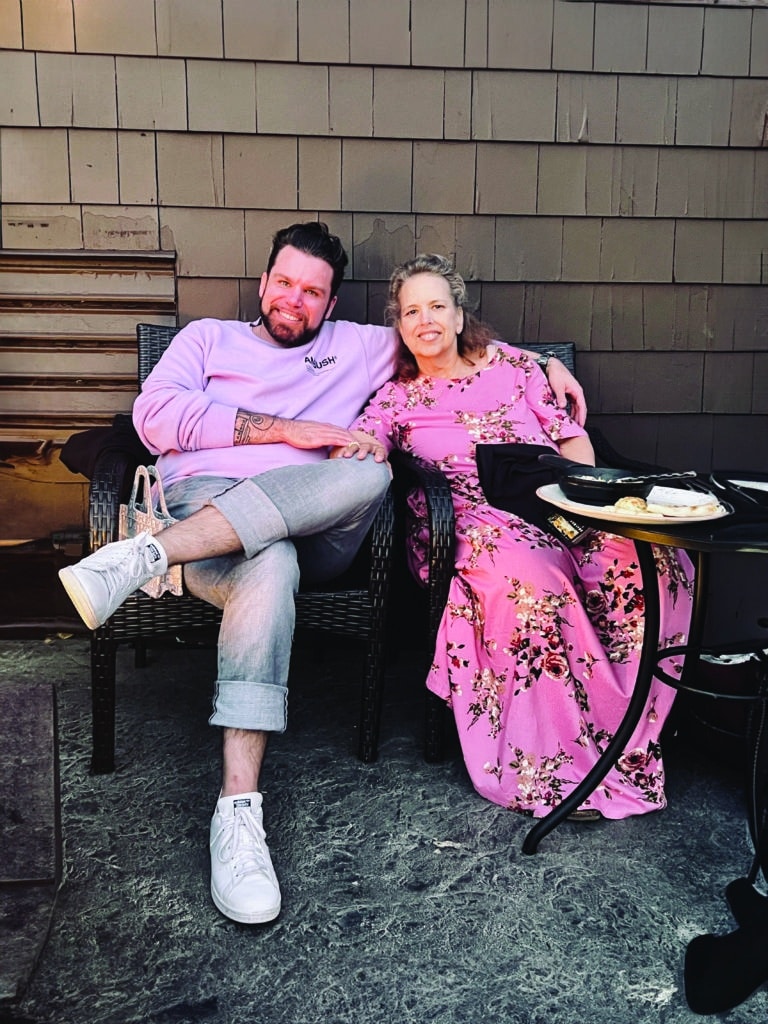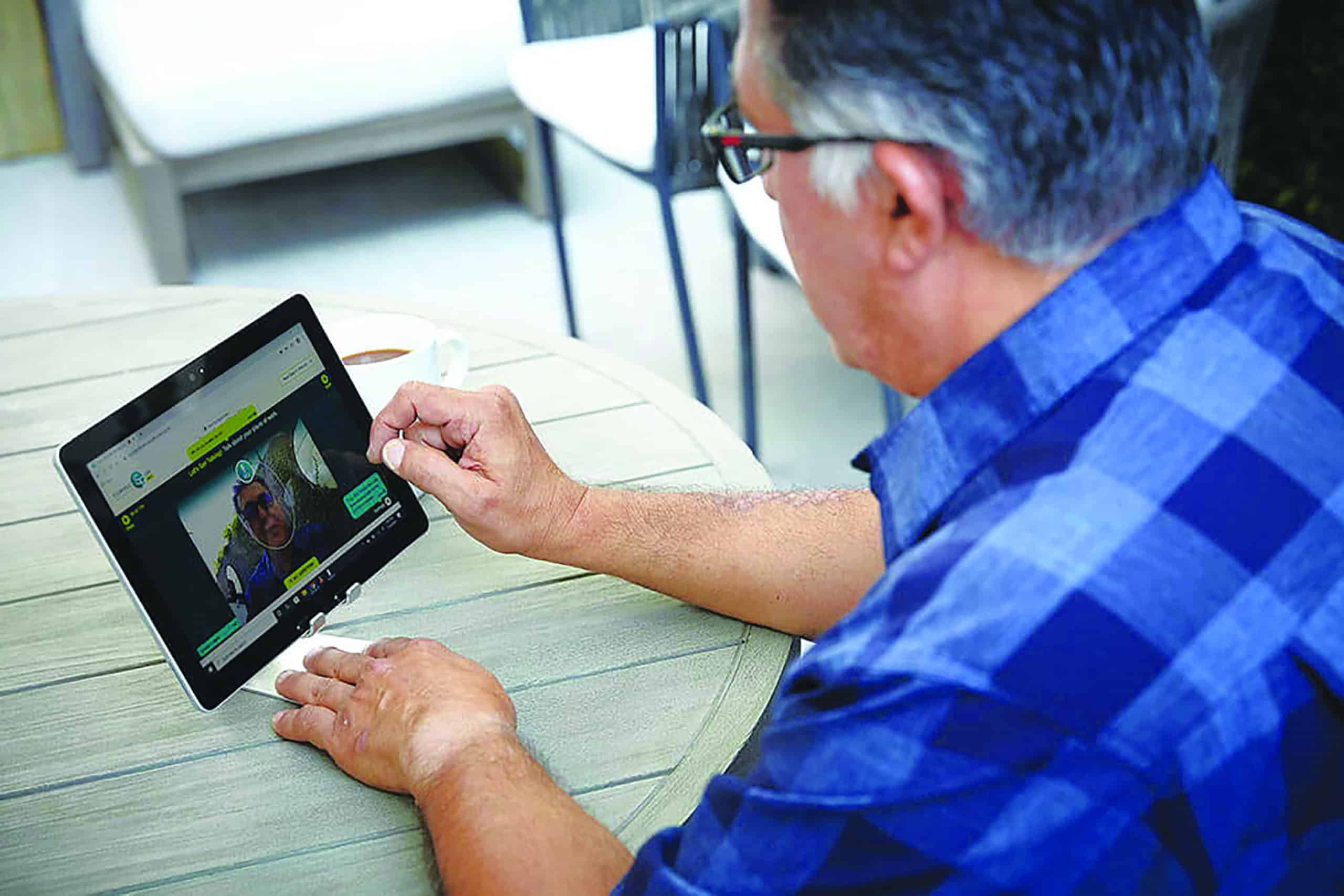Artificial intelligence is even reshaping the way we grieve. A fascinating look at grieftech chatbots and how some companies are creating vast archives of human experience to provide comfort and connection after a loved one’s passing.
For California-based Justin Harrison, it all began when two major life events coincided. He was in a near-fatal motorbike accident and around the same time, his mother was diagnosed with stage 4 gallbladder cancer. “They didn’t know whether or not I was going to pull through. I was pretty badly hurt. Later, my dad told me a story about him talking to me fresh out of surgery and he said I was talking absolute nonsense. I didn’t make any sense,” says Harrison. “So, he kept asking me the same question over and over again and even though I couldn’t answer it coherently, I started to get really annoyed that he was asking the same question again and again. He said that’s how he knew I was okay.”
Harrison had an aha moment. Throughout his mother’s illness, what he cared about – what he was worried he would miss – was how she would respond to him. “There’s thousands of versions of us and it all depends on who you’re talking to at the time. Everyone experiences a slightly different version of you,” he says And this is how You, Only Virtual (YOV) came to be, Harrison’s AI, grieftech startup where people never have to say goodbye to their loved ones.
“I created this for my mother, for me to stay connected. I think that eventually this kind of technology is going to redefine how we look at death,” he explains. YOV is a platform where someone can build a ‘Versona’ – a digital representation of someone’s personality using communication datasets. This could include text messages, phone calls, virtual meetings – any voice or text data which is then uploaded and analysed.
“In the backend, what we’re looking for are patterns and one of the things that I’ve learned in this process is that humans are incredibly predictable,” explains Harrison. “I also learned this from going through five years of messages and conversations and calls with my mom. I knew what I was going to say before I read the next line.”
Loading...

YOV uses AI to aggregate the nuances in the conversations to understand what makes it authentic. The end result is similar to a chatbot, but the responses are unique because of the personal data provided.
COMFORT THROUGH CONVERSATIONS
“We probably store the least consequential data,” laughs Harrison. “A Versona doesn’t do much for anybody except the person looking for that experience.”
Interacting with a Versona is about comfort and connectivity. It’s an incredibly personal experience that Harrison believes will alter how people grieve.
“I look at grief and death itself as a problem to be solved,” says Harrison. “We spend billions of dollars trying to circumvent everything that kills us. It is absolutely ridiculous to me that all the way up until someone dies, we’re trying to stop that… but then somebody dies and everyone is like, well that’s nature and we just have to get used to it.”
After years of studying psychology, Harrison’s understanding of grief is linked to how people talk about moving on. He says that the real tragedy of death is that you lose a version of yourself – the person you were when you were with them.
“People will say that when this person died, a part of me also died but it didn’t. It’s still there. It’s sitting alone,” he says. “For me, grief is ultimately yearning because there’s a big component of your personality that can no longer express itself. You were accustomed to engaging in a certain way and I think that if we can provide an outlet where at least that part of you can come out a little bit, it relieves some of the tragedy from loss.”
VIDEOS THAT TALK BACK
Harrison isn’t alone if you look at the number of grieftech startups popping up. From ‘ghostbots’ specifically designed to help with closure to an AI chatbot called Replika that alleviates loneliness by becoming your best friend, the intersection of machines and human interaction is shifting. Even the tech giants are finding ways to monetize grief with Amazon announcing that its virtual assistant, Alexa, will soon be able to read aloud in a deceased loved one’s voice – all the platform requires is a short recording from that person. Another company, StoryFile, based in Los Angeles in the United States, is taking conversational AI a step further by using video.
The idea for StoryFile actually goes back to 2010 when its co-founders, Heather Maio-Smith and Stephen Smith, were creating an exhibit with Holocaust survivors with the University of Southern California’s Shoah Center. Maio- Smith realized that the one-on-one interaction she was having with Rose Schindler (who passed away in February last year) wouldn’t be something Schindler’s grandchildren would experience. Seven years later, they launched StoryFile, a platform that turns video into two-way conversations, and Conversa AI, their conversational video engine.
“We’ve harnessed AI to make the experience as similar as possible to having a conversation with the person,” says Smith, StoryFile’s chairman. “One of the biggest challenges now is the public’s wariness of AI due to stories about generative AI hallucinations and so on — so we are very clear. The conversational videos of your loved ones won’t make up new things to say, the recorded material essentially becomes a unique LLM and when you interact with one of our files in the future it will only pull information from that.”
DIGITAL IMMORTALITY
While there have been ethical concerns around grieftech (such as the fact that there is a lack of consent from the deceased individual and how ‘staying in touch’ could affect mental health going forward), Smith says that people have preserved the legacy of loved ones in different ways since the beginning of history. It started with telling each other stories around the campfire.
“No one tells people how often to flip through a photo album or listen to that last voice mail they’ve kept on their phone… it’s up to people to decide how to use their conversational videos,” he says. “Some may decide not to access it for months or years after the loved one has passed – but people tell us they have comfort in the fact that it’s there for them, that the stories, the jokes, the expressions in the eyes, are not lost forever.”
For StoryFile’s co-founders, it comes down to the fact that they believe every person’s story is worth preserving.
“Heather and I don’t just want to harness this conversational video idea for business or grief use but to create a vast archive of human experience. We believe eventually a billion people will have created an AI-driven conversational video that will become an asset to all of humanity, a very human database of experience,” he says. “We didn’t come from Silicon Valley to do this – we’re historians, theologians, documentarians… We are here because we recognize the importance of being good ancestors and helping others do that too.”
Loading...
